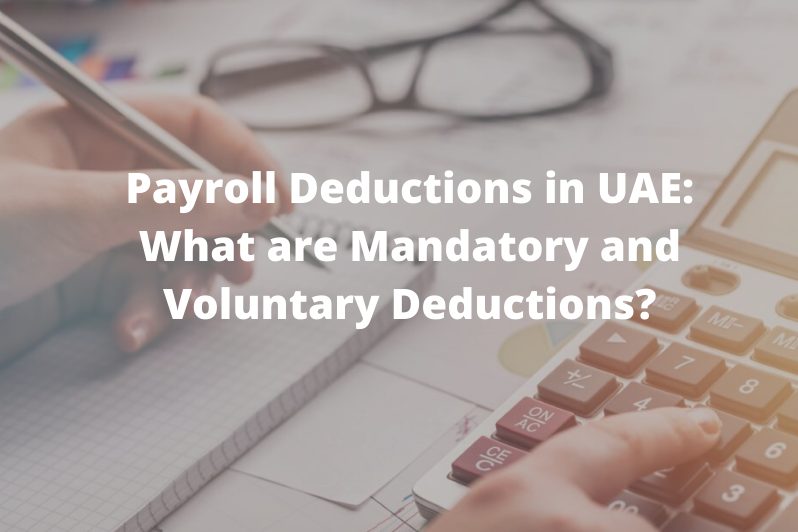There are deductions made to the wages of staff members employed in the United Arab Emirates, and they often fall into these categories: mandatory deductions and voluntary deductions. Mandatory deductions, as their name suggests, are wages that are being withheld from the paycheck of an employee to meet required obligations. As for voluntary payroll deductions, they are the payments that are made for health insurance contributions and advances among others.
Also read: Payroll Processing: What Happens During the Payroll Process?
Mandatory payroll deductions, as you may have presumed, are required by UAE legislation. Voluntary deductions on employee payroll, on the other hand, are choices that are made by the employee as agreed by both the employee and employer.
Mandatory Deductions on Employee Payroll
Mandatory deductions on employee payroll in UAE may include contributions for health insurance. Deductions can sometimes include garnishments that are court-ordered for payments to courts that have won judgments against particular employees and payments for delinquent child support among others.
Voluntary Deductions on Employee Payroll
Voluntary deductions on employee payroll can’t be withheld by an employer from the payroll cheque of an employee unless the concerned employee gives authorization on the deduction. Examples for this include:
- Retirement contributions to third party insurance provider(s);
- Life insurance premiums;
- Health insurance premiums (maybe for dental, vision, or medical plans);
- Contributions to flexible spending accounts;
- Short-term disability plans;
- Tools and uniform;
- Donations for an inter-office charity;
- Certification deductions or tuition fees;
- Inter-office purchases e.g. office equipment, TVs, and old computers
In every voluntary payroll deduction, there must be written authorization provided by the employee prior to the deduction being made by the payroll service team. The date, name, and reason behind the voluntary deduction have to be provided and have already been considered as a standard for many businesses in the region.
The signature of the employee is also required, and of course, the amount in AED or USD to be deducted. Other specific items may also be included in an authorization letter: the amount in AED or the preferred currency of the employee for a specific payroll period as well as the number of payroll records (in the case of multiple payments). Additionally, the name of the charity or individual that the money will be donated to and/or quantity or sizes with regards to tools or uniforms.
It is also important to remember that an employer in the United Arab Emirates can’t and should not hold final paychecks of employees until tools or equipment are returned following employee termination. UAE legislation states that employees are to receive their last pay prior to the termination. It is not considered an exception for withholding wages if there’s unreturned equipment. Payroll may be deducted by the employer if there is authorization that was provided by the employee.
It could also be that the employer has considered providing the employee with an invoice regarding the cost of equipment. With this, the matter can be pursued by the court against the former employee. This is the recommended route as there is no withholding of salary involvement. The employer and employee will receive the legal judgment of the court regarding the expense for equipment that needs to be paid or the cost of any item.
Payroll Processing Services in UAE
Do you see deductions on your pay cheques every pay period? It pays really well to know what deductions were made and why they were deducted as you have a right towards your compensation. Payroll deductions, as described in the article, can either be voluntary or mandatory. By knowing the difference between the two categories of deductions, you will determine why you receive a certain amount as your salary. You will also find out what needs to be paid for by you. If you have questions or concerns after learning about the information we imparted in this article, we suggest you call us for an initial consultation. We can answer all your questions regarding compensation in the UAE. Additionally, we are able to process the payroll functions of businesses anywhere in the region. Call us today!
What are the main types of deductions made to the wages of employees in the UAE?
The three main types of deductions for wages in UAE are as follows:
- Deductions that are required by UAE legislation or those ordered by proper courts;
- Deductions that are for the convenience of the employee;
- Deductions that are for contributions to interoffice matters
Can my employer deduct my paycheque every pay period?
An employer in the UAE may deduct certain items from the wages of employees in the UAE. In general, an employer in the country can deduct money if it’s authorized legally or if the employee has agreed to it voluntarily. For the latter, there has to be consent for the deduction.
You may also read: 5 Tips on Creating Employee Handbooks and Policy Manuals
What is included in a pay stub?
A pay stub for an employee in UAE includes gross wage, deductions (mandatory or voluntary), and net pay (pay that will be given to an employee after deductions are made from the gross wage).




